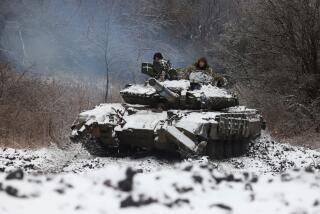Kremlin Tremors
- Share via
Russian nationalists who insist that their country remains a great power capable of great deeds need only look at Moscow’s effort to suppress the revolt in tiny Chechnya to find that claim contradicted. Chechnya is a gruesome tragedy that has already claimed an estimated 30,000 lives, mainly civilians. It also deserves a place in future military textbooks as a classic study in tactical ineptitude and administrative failure. After 20 months, bungling continues to mark Russia’s desperate attempt to quash Chechen secessionism.
On Wednesday, Gen. Konstantin Pulikovsky, the acting military commander in Chechnya, was publicly reprimanded by Defense Minister Igor Rodionov and criticized by Alexander Lebed, President Boris Yeltsin’s security advisor, for ignoring orders and carrying out unauthorized attacks. He did not, however, lose his job. On Thursday, Yeltsin, in his first appearance in two weeks, turned the tables and criticized the ambitious Lebed for failing so far to end the Chechnya fighting. Meanwhile, Lebed had apparently negotiated another truce with Chechen rebels, though given the apparent breakdown in the Russian chain of command it remains to be seen whether orders to honor it will be carried out.
The clear chaos over policy in Chechnya must be assumed to stem from Yeltsin’s inability to carry on with his work because of failing health. With Yeltsin unable to exercise leadership, rivalries among those who hope to inherit his office have come to the fore, and dissension in the upper ranks of the military has now come close to open mutiny.
Yeltsin’s aides promise he will be back at work and back in charge of things today. Maybe. But the president’s condition and the breakdown in control it has led to are now a cause for concern well beyond the borders of the shaken Russian federation.
More to Read
Sign up for Essential California
The most important California stories and recommendations in your inbox every morning.
You may occasionally receive promotional content from the Los Angeles Times.













